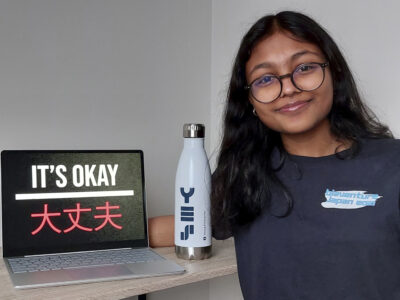
A student at Pakuranga College was crowned one of five winning high schoolers for a solution towards enhancing mental well-being.
The Lion Young Enterprise Scheme (YES) is a part of Abirami Kabilan’s Year 13 Business Studies curriculum. It’s a year-long nationwide programme where students get to start up their own businesses.
One of their few extra programmes that students can apply for to deepen their business experience is BizVenture Japan, which gives Kiwi and Japenese students experience in forming business solutions that address the UN’s Sustainable Development Goals.
“When I saw the opportunity pop up on the YES newsletter, my initial thoughts were, ‘Hey that’s interesting, but I don’t have the courage to do it,'” Kabilan, 17, says.
“I realised that if I don’t step out of my comfort zone, I’ll never grow as a person.”
Kabilan was one of 40 students selected from 4700 who applied to participate. They were given three of the UN’s sustainable development goals to choose from – poverty, teenage well-being or gender equality.
Her team, made up of Benjamin Young from Tauranga Boys’ College, Hamish Robinson from Taradale High School, Daniel Blight from Waimea College and Kaiah Sherriff from Southland Girls, chose teenage well-being.
“Teenage well-being is pretty huge problem in Japan,” Kabilan says. “UNICEF reports that out of 41 OCED countries, Japan is 37th for children’s mental health according to factors such as life satisfaction and suicide rates.”
Despite the large number of people facing health issues in Japan, there’s a huge stigma surrounding the topic as revealing your struggles is a sign of weakness, Kabilan says.
“That only oppresses those with mental health issues and prevents them from seeking treatment which is why we wanted to raise awareness and normalise conversations about it.”
After hearing about the success of a similar brand in America called ‘Make Sure Your Friends Are Okay’, the team was inspired to come up with a sustainable clothing brand. “We actually looked into what kind of clothing trends are popular among Japanese teens,” she says.
“One of our members is highly skilled at using Photoshop so he designed some pieces we validated with the Japanese students taking part.”
The creative process, Kabilan says, wasn’t as challenging as she thought because of the team’s great work ethic.
“Everyone was just so onto it,” she says. “I feel really thankful to have worked alongside such great, hard-working people.”
The team was crowned winner of the BizVenture Programme.
“I was really stoked when we won,” Kaliban says. “I was happy all our hard work paid off.”
One of the most interesting things about being involved in a cross-cultural experience was seeing how the Japanese students approached the same problems as us, Kaliban says.
“One thing I noticed was how tech-based their solutions were, reflecting what a modern and tech savvy nation Japan is.
“It made me think about how young people around the world in other countries will have such different ways of approaching these problems too. Imagine the ideas we would come up with if we all worked together.”
Kaliban is planning on taking up a Bachelors of Business next year at the Auckland University of Technology (AUT).







